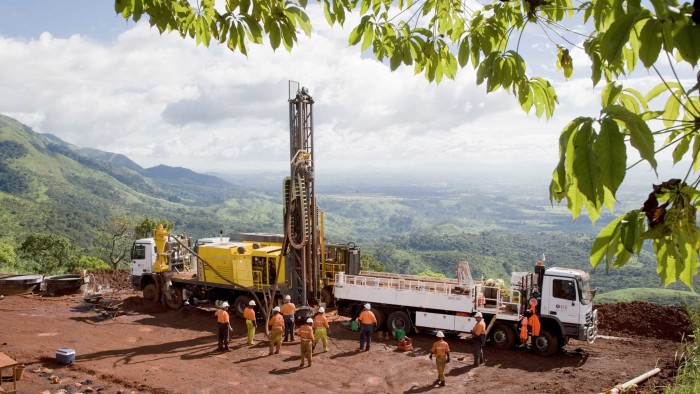Rio Tinto and Vale step up battle over Guinean deposit

Roula Khalaf, Editor of the FT, selects her favourite stories in this weekly newsletter.
Rio Tinto’s lawsuit claiming Vale cheated it out of billions of dollars adds to the conflicting accounts of the battle over a trove of minerals in a remote corner of Africa – and shines a light on a struggle between the two biggest companies in the global iron-ore market.
Rio’s claim, which the Anglo-Australian group filed in New York on Wednesday, alleges that Vale of Brazil conspired with Beny Steinmetz and the mining arm of the Israeli tycoon’s family conglomerate, BSG Resources, to “steal” part of its rights to the world-class Simandou iron-ore deposit in Guinea.
Rio was granted rights to prospect Simandou in 1997 and over the next 11 years spent what it says was hundreds of millions of dollars on exploration. In August 2008, according to the lawsuit, Rio entered talks with Vale about selling an interest in Simandou. Rio says it allowed Vale access to “highly confidential and proprietary information” regarding the project – information that, Rio claims, Vale “improperly divulged” to BSGR as part of a joint effort to snatch a piece of Simandou illicitly.
Rio says that it told Vale during those negotiations that BSGR was trying to “misappropriate” Simandou. In December 2008, rights to the northern half of the deposit were granted to BSGR, after what an inquiry by the current Guinean government concluded last month was a bribery scheme involving the wife of the veteran dictator, Lansana Conté. Less than 18 months later, Vale announced an agreement to buy a 51 per cent stake in BSGR’s Guinean assets for $2.5bn.
A spokesperson for BSGR and Mr Steinmetz, who deny the corruption allegations, on Wednesday called the lawsuit “baseless and bizarre” and maintained that Rio lost its rights because it failed to bring Simandou into production.
BSGR offers a different version of events in a statement published last year. The Guernsey-registered group says that, after it acquired rights to the northern half of Simandou, it held talks with three other potential investors – the Libyan Investment Authority and two Chinese groups, Chinalco and Baosteel – before striking its deal with Vale.
BSGR says that it was approached by Vale in early 2010 and that “intense weeks of negotiations” followed. It says that Roger Agnelli, Vale’s chief executive at the time, “admitted to BSGR that his group . . . was very familiar with the Simandou asset since it had made an offer to Rio Tinto several years earlier to purchase the Simandou project from them for $4bn”. BSGR adds that Mr Agnelli made this disclosure only after it signed its deal with Vale and that, until then, it had been “surprised by the detailed knowledge of the Vale due diligence team regarding the asset’s geology and data”.
Interactive timeline

The Simandou project has been dogged by delays and disputes. Mining companies continue to vie for control but few now expect Simandou to yield its treasure before the end of the decade, if then
Vale on Thursday declined to comment on BSGR’s account and says it is studying Rio’s filing. It has said it conducted “extensive” due diligence before its deal with BSGR and received “representations that BSGR had obtained its mining rights lawfully and without any corrupt or improper promises or payments”. Vale paid $500m of the $2.5bn fee to BSGR upfront but has not paid the balance. Guinea cancelled the Vale-BSGR joint venture’s rights last month, in the wake of the corruption inquiry, and plans to put them out to tender.
Both Vale and BSGR, which says it is the victim of a plot to seize its assets, have said that they are weighing legal action in response to the cancellation of their rights. Rio, which retains the southern half of Simandou and in 2011 paid $700m to settle its outstanding disputes with the government, signalled last year that it might be interested in seeking to reclaim its lost rights if they became available. But Vale is not out of the hunt: the Guinean inquiry recommended that only BSGR – not Vale – be barred from bidding, after concluding that it was “likely” that Vale had not participated in corruption.
Rio claims that the alleged conspiracy to capture the northern half of Simandou cost it billions of dollars and is seeking damages “in an amount to be determined at trial”. But the ultimate prize is larger still.
“This is a battle to the death for control of Simandou, with the clear understanding that the firm that controls it also has a dominant position in the iron industry for a generation to come,” says a person close to the Guinean government.
Rio and Vale hold the world’s two most important deposits of iron ore, in Australia and Brazil respectively. Few deposits can match Simandou’s size and quality, analysts say, even if exporting its ore would mean spending billions on a railway and a port.
A rush of new production from Guinea could depress ore prices, making other projects less lucrative, adding to the strategic importance of controlling Simandou for the industry’s rivals. “They want to have their flags in it,” says Des Kilalea, mining analyst at RBC Capital Markets.
Comments